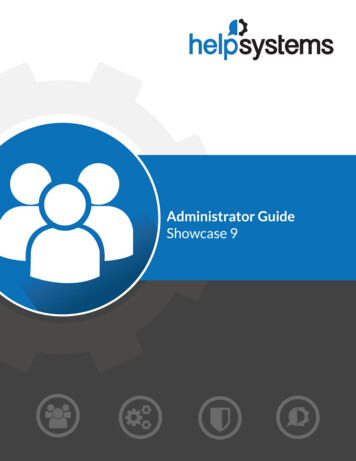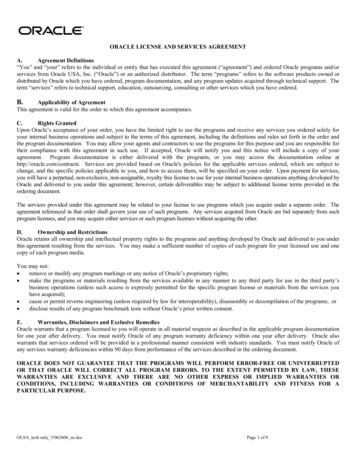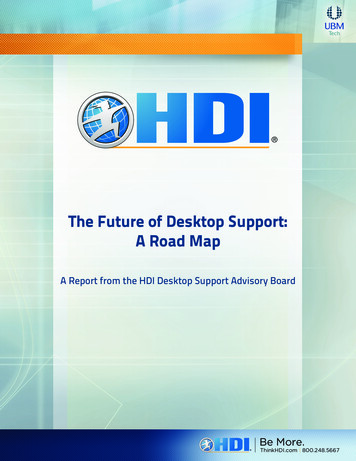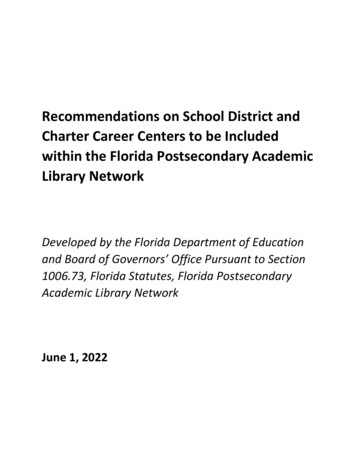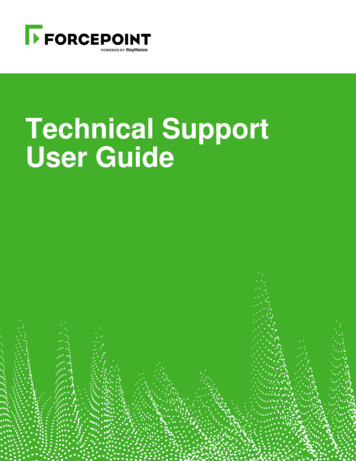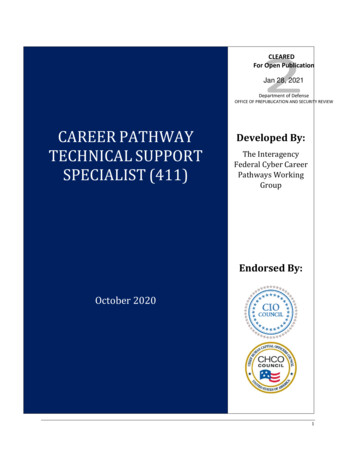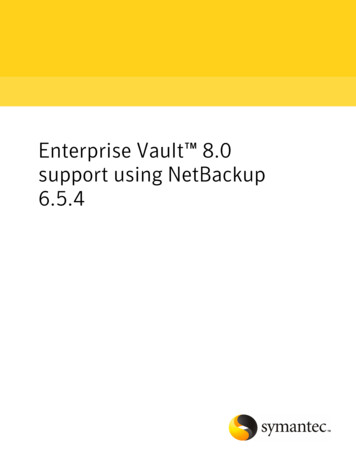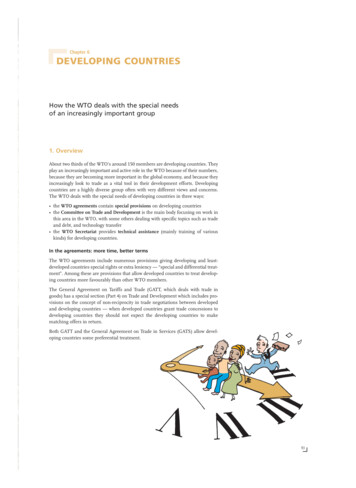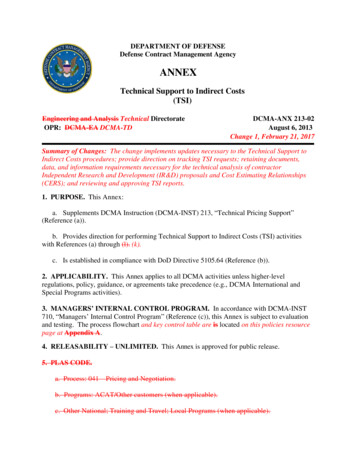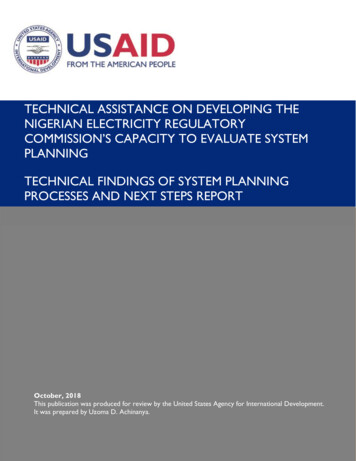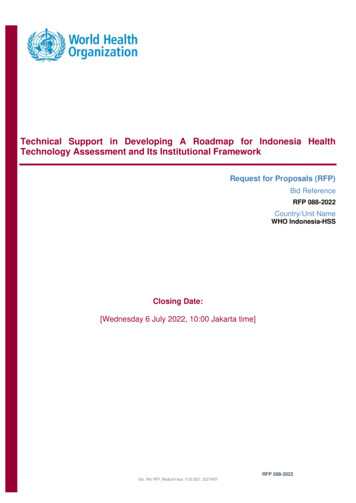
Transcription
Technical Support in Developing A Roadmap for Indonesia HealthTechnology Assessment and Its Institutional FrameworkRequest for Proposals (RFP)Bid ReferenceRFP 088-2022Country/Unit NameWHO Indonesia-HSSClosing Date:[Wednesday 6 July 2022, 10:00 Jakarta time]Doc. Ref: RFP MediumValue V.03 2021 20210407RFP 088-2022
2Country/Unit Name WHOIndonesia-HSS1.INTRODUCTION . 41.1Objective of the RFP . 41.2About WHO . 41.2.1WHO Mission Statement . 41.2.2Structure of WHO . 41.2.3Description of Office/Region or Division/Service/Unit . 41.3Definitions, Acronyms and Abbreviations . 52.BACKGROUND: DESCRIPTION OF PRESENT ACTIVITIES . 62.1Overview . 62.2Objectives & coordination . Error! Bookmark not defined.3.REQUIREMENTS . 83.1Introduction . 83.2Characteristics of the provider. 83.2.1Status. 83.2.2Accreditations . 83.2.3Previous experience . 83.2.4Staffing. 83.3Work to be performed . 83.3.1Key requirements . 103.3.2Place of performance . 103.3.3Timelines . 103.3.4Reporting requirements . 103.3.5Performance monitoring . 103.3.6Further capacities . 104.INSTRUCTIONS TO BIDDERS . 114.1Language of the Proposal and other Documents . 114.2Intention to Bid. 114.3Cost of Proposal . 114.4Contents of the Proposal . 114.5Joint Proposal . 114.6Communications during the RFP Period . 124.7Submission of Proposals . 124.8Period of Validity of Proposals. 134.9Modification and Withdrawal of Proposals . 134.10Receipt of Proposals from Non-invitees . 134.11Amendment of the RFP . 134.12Proposal Structure. 144.12.1Acceptance Form . 144.12.2Executive Summary . 144.12.3Information about Bidders . Error! Bookmark not defined.4.12.1Approach/Methodology . 144.12.2Proposed Solution . 144.12.3Proposed Time line . 154.12.4Financial Proposal . 154.13Conduct and Exclusion of Bidders . 155.EVALUATION OF PROPOSALS . 175.1Preliminary Examination of Proposals . 175.2Clarification of Proposals . 175.3Evaluation of Proposals . 175.4Bidders' Presentations . 196.AWARD OF CONTRACT . 206.1Award Criteria, Award of Contract . 206.2WHO's Right to modify Scope or Requirements during the Evaluation/Selection Process . 206.3WHO's Right to Extend/Revise Scope or Requirements at Time of Award . 206.4WHO's Right to enter into Negotiations . 20Doc. Ref: RFP MediumValue V.03 2021 20210407RFP 088-2022
3Country/Unit Name WHO6.56.6Indonesia-HSSSigning of the Contract . 20Publication of Contract . 217.GENERAL AND CONTRACTUAL CONDITIONS . 227.1Conditions of Contract . 227.2Responsibility . 237.3Audit and Access . 237.4Source of Instructions . 237.5Warranties . 237.6Legal Status. 247.7Relation Between the Parties . 247.8No Waiver . 247.9Liability . 247.10Assignment . 257.11Indemnification . 257.12Contractor's Responsibility for Employees . 257.13Subcontracting. 257.14Place of Performance . 257.15Language . 257.16Confidentiality . 267.17Title Rights . 267.18Termination and Cancellation . 267.19Force Majeure. 277.20Surviving Provisions . 277.21Use of WHO name and emblem. 277.22Publication of Contract . 277.23Successors and Assignees . 277.24Payment . 287.25Title to Equipment. 287.26Insurance and Liabilities to Third Parties . 287.27Settlement of Disputes . 287.28Authority to Modify . 297.29Privileges and Immunities . 297.30Anti-Terrorism and UN Sanctions; Fraud and Corruption . 297.31Ethical Behaviour. 297.32Officials not to Benefit . 297.33Compliance with WHO Codes and Policies . 307.34Zero tolerance for sexual exploitation and abuse . 307.35Tobacco/Arms Related Disclosure Statement . 307.36Compliance with applicable laws, etc. 307.37Breach of Essential Terms . 318.PERSONNEL . 328.1Approval of Contractor Personnel . 328.2Project Managers . 328.3Foreign Nationals. 328.4Engagement of Third Parties and use of In-house Resources . 339.LIST OF ANNEXES & APPENDICES . 34Doc. Ref: RFP MediumValue V.03 2021 20210407RFP 088-2022
4Country/Unit Name WHOIndonesia-HSS1.INTRODUCTION1.1Objective of the RFPThe purpose of this Request for Proposals (RFP) is to enter into a contractual agreement with a successfulbidder and select a suitable contractor to carry out the following work: To provide technical support to MOH inDeveloping Roadmap for Indonesia Health Technology Assessment and its institutional framework.WHO is an Organization that is dependent on the budgetary and extra-budgetary contributions it receives forthe implementation of its activities. Bidders are, therefore, requested to propose the best and most costeffective solution to meet WHO requirements, while ensuring a high level of service.1.21.2.1About WHOWHO Mission StatementThe World Health Organization was established in 1948 as a specialized agency of the United Nations. Theobjective of WHO (www.who.int) is the attainment by all peoples of the highest possible level of health.“Health”, as defined in the WHO Constitution, is a state of complete physical, mental and social well beingand not merely the absence of disease or infirmity. WHO's main function is to act as the directing andcoordinating authority on international health work.1.2.2Structure of WHOThe World Health Assembly (WHA) is the main governing body of WHO. It generally meets in Geneva in Mayof each year and is composed of delegations representing all 194 Member States. Its main function is todetermine the policies of the Organization. In addition to its public health functions, the Health Assemblyappoints the Director-General, supervises the financial policies of the Organization, and reviews and approvesthe proposed programme budget. It also considers reports of the WHO Executive Board, which it instructswith regard to matters upon which further action, study, investigation or report may be required.The Executive Board is composed of 34 members elected for three-year terms. The main functions of theBoard are to give effect to the decisions and policies of the WHA, to advise it and generally to facilitate itswork. The Board normally meets twice a year; one meeting is usually in January, and the second is in May,following the World Health Assembly.The WHO Secretariat consists of some 8,400 staff at the Organization's headquarters in Geneva, in the sixregional offices and in countries. The Secretariat is headed by the Director-General, who is appointed by theWHA on the nomination of the Executive Board. The head of each regional office is a Regional Director.Regional directors are appointed by the Executive Board in agreement with the relevant regional committee.1.2.3Description of Office/Region or Division/Service/UnitWHO is the specialized agency of the United Nations with objectives to promote health, keep the world safeand serve the vulnerable. The WHO Indonesia Country Office directs and coordinates the authority for healthby supporting the Government of Indonesia in the formulation, implementation and evaluation of nationalhealth policies, strategies and plans, setting norms and standards, improving knowledge dissemination andmanagement, monitoring country health situation and building sustainable institutional capacity.Within the framework of the Collaborative Country Cooperation Strategy, the Health Systems Programe’sobjective is to promote universal health coverage through strengthening primary health care. The Programmesupports the Government of Indonesia in advocating for a more integrated human resource development;facilitating the delivery of quality and integrated people-centred services; ensuring equity in national healthpolicies, strategies and plans through formulation of legal and regulatory frameworks to implement the HealthDoc. Ref: RFP MediumValue V.03 2021 20210407RFP 088-2022
5Country/Unit Name WHOIndonesia-HSSFinancing Strategies and further strengthening capacities in generating information and utilizing evidence aswell as in ensuring equality medical products The Programme is mainstreamed into six areas: 1) Nationalhealth policies, strategies and plans, 2) Health Financing, 3) Human Resource for Health, 4) Integratedpeople-centered health services, 5) Access to medicines and health technologies, and 6) Health systeminformation and evidenceEnter1.3Definitions, Acronyms and AbbreviationsWHOHTAJKNMOHPusjak PDKWHOWorld Health OrganizationHealth Technology AssesmentJamian Kesehatan NasionalMinistry of HealthCenter of Health Financing and DecentralizationWorld Health OrganizationDoc. Ref: RFP MediumValue V.03 2021 20210407RFP 088-2022
6Country/Unit Name WHO2.Indonesia-HSSBACKGROUNDIf any: description of the existing activities currently undertaken by WHO Indonesia-HSS i.e. prior to thepublication of this Request for Proposals, and related to its objectives.2.1OverviewSince the Indonesia government embarked on major health insurance reform in 2014 through introducing anational health insurance (JKN) program, Indonesia has made tremendous efforts to achieve the long-termobjective of UHC—providing affordable and equitable health service with leaving no one behind. Theintroduction of JKN is based on the passage of the National Social Security (SJSN) Law No. 40/2004 whichrequires the establishment of national-wide health insurance scheme as part of the National Social Securitysystem in the country.New interventions and technologies are constantly being developed and refined but their impacts on health,and implications for health systems, are not always clear. Health technology assessment (HTA) is a systematicand multidisciplinary evaluation of the properties of health technologies and interventions covering both theirdirect and indirect consequences. It is a multidisciplinary process that aims to determine the value of a healthtechnology and to inform guidance on how these technologies can be used in health systems around theworld.Jaminan Kesehatan Nasional (JKN) scheme in Indonesia, as mandated by the law, should provide acomprehensive health care service to Indonesia people and this includes covering new health interventionsor technologies. On the other hand, JKN scheme, as one of the main vehicles to achieve UHC in Indonesia,should ensure the quality of health service and sustainability of the JKN program. This is where HTA playsmore and more important role. JKN scheme will cover health technology as long as its included in the bundledINA-CBG. However, if a technology is too expensive to be covered by JKN, it must be mutually agreed thatthe technology indeed needs to be guaranteed.HTA is a multidisciplinary process that uses explicit methods to determine the value of a health technology atdifferent points in its lifecycle. The purpose is to inform decision-making in order to promote an equitable,efficient, and high-quality health system. Uses of HTA as tools for cost and quality control is mentioned in thePresidential Regulation (Perpres) No. 82/2018 on health insurance, in article 85 paragraph (1), which mentionthat the use of HTA result is determined by the Minister after obtaining a recommendation from HTAcommittee. Hereinafter, Indonesia HTA Committee (INA-HTAC) has been formed since 2014. The committeeconsist of academicians, clinicians and professionals with specific task to answer the question: “Is a givenhealth technology/medication worth its price for the value it provides?”.WHO Global Survey on Health Technology Assessment by National Authorities in 2015 showed that less than50% countries had legislative requirements to formalize HTA results in health care decision making. HTAinstitutionalization is important as it refers to promoting structures and processes suitable to producetechnology assessments that will be powerful in guiding policy and clinical practice towards the best possiblehealth and cost outcomes. To support institutionalization process of HTA in Indonesia, a road map will beprepared as key strategic point for the institutionalized process of HTA in Indonesia.Center of Health Financing and Decentralization MOH (Pusjak PDK) has collaborated with WHO Indonesia toinitiate the process. A situational analysis was carried out as initial stage with situational analysis documentas result which contains overview of HTA implementation from 2014 to date, identification of external andinternal driver factors of HTA implementation, HTA’s stakeholder and structure of the current HTA supplychain value, including expectation of ideal conditions regarding how HTA should work and be utilized.The analysis revealed the complexity of the issue such as the difficulty in applying a suitable and do-able HTAresearch design while available studies overseas shall have certain transferability issue to be adopted inIndonesia. Although the HTA committee and MOH have exerted much efforts to conduct the HTA studies tosupport evidence-based decision making, the adoption of HTA committee’s recommendation sometime mightstill be affected by many external factors. In the new era of JKN as single pool of national health insurance,the HTA studies have been regularly conducted with much focus put only in the economic evaluation andDoc. Ref: RFP MediumValue V.03 2021 20210407RFP 088-2022
7Country/Unit Name WHOIndonesia-HSScost-effectiveness. A more comprehensive approach such as multi criteria decision analysis should beconsidered in the model, particularly related to the quality of health care.This, in fact, has demonstrated that despite HTA has been recognized as important tool to improve efficiencythrough prioritizing resources, there were large spaces for improvement on HTA infrastructures and decisionmechanisms of prioritization in Indonesia, including capacity building, financing HTA research, process andorganizational structure for HTA, standardization of HTA methodology, use of local data, scope of mandatoryHTA, decision criteria, and international collaboration in HTA.Further work will focus on developing HTA institutional design options through small discussion groups tointensively discuss issues of interest such as institutions, infrastructure, guidelines, guidelines, regulations,and other relevant aspects until the framework of the Indonesian HTA institutional model is agreedDoc. Ref: RFP MediumValue V.03 2021 20210407RFP 088-2022
8Country/Unit Name WHO3.REQUIREMENTS3.1IntroductionIndonesia-HSSWHO requires the successful bidder, the Contractor, to carry out provide technical support to MOH inDeveloping Roadmap for Indonesia Health Technology Assessment and its institutional framework3.23.2.1Characteristics of the providerStatusThe Contractor shall be a for profit / not for profit institution operating in the field of Public Health and HealthFinancing .3.2.2AccreditationsAn accreditation (institution) or an on-going accreditation process by a certified accreditation body would bean asset (desirable).3.2.3Previous experienceMandatory: Proven experience in the field of Health Technology Assessment. Previous work with WHO, other international organizations and/or major institutions in the field of Public healthpolicy and health financing policy;Desirable:1. Institution/company with previous working experiences in providing technical support in regulatoryaspect of health technology assessment with WHO and MOH is preferable.3.2.4StaffingThe selected institution shall submit the appointed staffs dedicated to work for this project. The team lead andstaffs’ name should be nominated with the proposal. His/her CV and experience relevant to public healthpolicy research, particularly in health financing or health technology assessment, should be submitted withthe proposal as well. An information about the role and the proportionate time the appointed researcher willdedicate to the project should also be included in the submission and in the financial proposal. Please alsosee the budget plan template for further information. All staff with full professional working proficiency/nativeor bilingual proficiency in English and Bahasa.The bidder is expected to outline the roles and responsibilities of those staff in the technical proposal.Activities will be carried in normal working hours of Indonesia (mostly in WIB) time zone.3.3Work to be performedIn general, the activity consists of 3 phases:Doc. Ref: RFP MediumValue V.03 2021 20210407RFP 088-2022
9Country/Unit Name WHOIndonesia-HSSPhase-2: Develope an AgreedModel of HTA IndonesiaInstitutional FrameworkPhase-3: Writing a Roadmap forthe HTA-Indonesia Model* Please note that phase 1 had been conducted in 2021A. Phase-2: Agreement on the Institutional Model of Indonesian HTAAgreement on important institutional model was determined at the beginning of the development of theRoadmap, this agreement will be reached through:a.Discussion on the results of the “Situation Analysis” at the key-stakeholder level and InaHTAC todetermine the model or institutional form of Indonesian HTA. In order to develop a comprehensive and feasibleHTA model, the researchers and policy makers should not only consider economic evaluation but should viewHTA model from broader aspects of HTA, particularly in terms of safety, efficacy, effectiveness, psychological,social, ethical, organizational, professional aspects. This is also emphasized in WHO technical guidance nt.b.Prepare several choices of institutional forms with analysis of pros and cons, and then submit them tohigh-level meeting forums until an Indonesian HTA model is agreed.Phase 2 is carried out by holding working meetings, focus group discussions, in-depth interviews, and highlevel meetings based on the nature and needs of the required outputs.The output of phase 2 is an HTA-Indonesia Institutional Model document.B. Phase-3: Writing HTA-Indonesia Roadmap DocumentThe development of the HTA-Indonesia Roadmap is carried out from the approved institutional model throughintensive discussions with the HTA Committee, the Ministry of Health, and other relevant stakeholders.The Roadmap will be in the form of milestones, time frame and resource requirements for the implementationof HTA institutional development in the next 10-year period. Some of the main things that will be described inthe Roadmap are:a.Visions and purposeb.Principal activitiesc.Guiding principlesd.Strategic area and indicatore.Approachesf.Action plang.BudgetingPhase 3 is carried out by holding working meetings, focus group discussions, in-depth interviews, and highlevel meetings based on the nature and needs of the required outputs.Output stage 3 is the Indonesian HTA Roadmap documentThe followings are the scope of work for the selected instituion:1)Developing background and appropriate methodology2)Organize, monitor and supervise each activities including data collection activities (documents review,focus group discussion (FGD) and/or in-depth interview), stakeholder meetings, and high-level meetings.3)Prepare background and technical paper as necessary.4)Organize materials in in electronic and hard copy files.Doc. Ref: RFP MediumValue V.03 2021 20210407RFP 088-2022
10Country/Unit Name WHO5)6)3.3.1Indonesia-HSSAttend and participate in every stakeholder review meeting.Set deliverables reports for each phase in Bahasa Indonesia and English version.Key requirementsQualifications:1.The selected institution shall have a strong academic theoretical knowledge, technical expertiseand experience, as well as extensive networking within all levels of the Indonesian system in theareas of the health technology assessment, and legal aspects of social health protection.2.The selected institution shall provide adequate technical team members with master degreerelated to health economics or health financing background, with equivalent background ineconomic evaluation in health, health technology assessment, health financing, health policy, orother related field.3.Availability of technical staffs with excellent capabilities and deep understandin in governmentpolicies, multi government agencies, legislation and strategies related to social health insurance,health technology assessment or other related fields.4.Availability of technical staffs that has comprehensive knowledge and experience of HTAsystems in other countries5.The selected institution shall be able to provide systematically in technical and financial reportsaccording to the activity outputs.3.3.2Place of performanceThe successful bidder/s shall provide technical support to MOH in Developing Roadmap for Indonesia HealthTechnology Assessment and its institutional framework. Place of performance will be mostly in Jakarta wherethe focus group discussion and technical expert meetings will be held but cannot rule out possibility of venuechange.3.3.3TimelinesThe project is expected to be completed in 6 months (July 2022 – 31 December 2022).3.3.4Reporting requirementsThe project manager of the sele
taken all steps to submit their proposals in advance of the above closing date and time. 4.8 Period of Validity of Proposals. The offer outlined in the proposal must be valid for a minimum period of 180 calendar days after the closing date for submission of proposals . A proposal valid for a shorter period may be rejected by WHO. In exceptional

